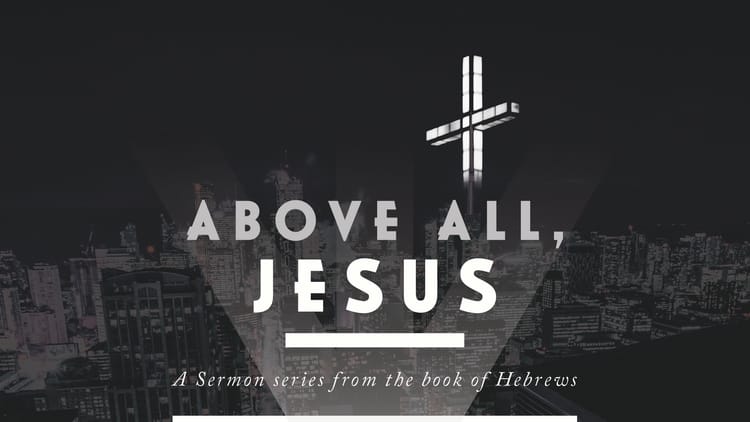Hold Fast When You're Tempted to Fall Away (Hebrews 11)

Big Idea: Trust what God says is true, even when it doesn’t look like it.
Jennifer has a good job in finance. She is responsible for picking investments for clients. She’s on a team that has identified a good investment opportunity. The only problem is that this company, in Jennifer’s mind, doesn’t make a positive contribution to society but damages it. It conflicts with her convictions as a Christian. She could have gone ahead with the investment, but it would have violated her convictions. She wrestled with what to do, and in the end she decided that she wouldn’t veto the deal, but wouldn’t participate in any bonus that came from the investment. This is going to cost her financially, because that bonus is going to be big. She knows this may hurt her reputation among those who don’t share her convictions.
William didn’t grow up in a Christian home, but he became a Christian about seven years ago. As he’s grown in his faith, he’s become convinced that God has designed marriage as a covenantal, lifelong relationship between one man and one woman that’s meant to signify the covenant love between Christ and his church. The challenge for William is that he experiences same-sex attraction. He’s lonely, and some of his friends think he’s crazy, but he believes that God’s revealed will for all people is chastity outside of marriage and fidelity within marriage. And so he’s committed to chastity, even though it means he won’t enjoy the partnership that he longs to experience.
Ming grew up in a Christian home. She trusted Christ at an early age. She’s part of a good church. But some of her friends have deconstructed, and church has sometimes left her feeling hurt and disappointed. She’s second-guessing her faith and wondering if it might be better to take a break from church and maybe even take her faith a little less seriously.
Jennifer, William, and Ming are all facing similar versions of the same thing. Following Jesus is hard. It comes with a cost, and at first glance it doesn’t seem obvious that it’s worth paying that cost. It would be so easy for all of them to take the other route because the advantages are so obvious, and it can be hard to follow Jesus when it costs.
Hebrews 11 speaks to Jennifer, William, Ming, and us with a simple and urgent message: Trust what God says is true, even when it doesn’t look like it.
- Trust what God says is true about storing up treasures in heaven and living for his approval, even when it means losing out on a big bonus and the approval of colleagues at work.
- Trust what God says is true about sex, even when what he says about sexuality and chastity is costly.
- Trust that God is worth following even when we’re hurt by others in the church and our friends are falling away.
We’re in a series on Hebrews. Hebrews is written to a group of Christians who faced the temptation to abandon Jesus because the cost of following Jesus was so high. The writer has had one consistent message throughout the book: Jesus is worth following no matter what the cost because Jesus is better than anyone or anything else. When you see the incomparable greatness of Jesus, it will lead you to stand firm in Jesus even when it’s hard. That’s the main point of this book. When you see the incomparable greatness of Jesus, it will lead you to stand firm in Jesus even when it’s hard.
The writer has been showing us the supremacy of Jesus, but in the chapter we just read, he does something else. He gives us examples of people who stood firm in their faith even when it was hard because they believed that the spiritual realities that God revealed are true, even when they couldn’t see them, and even when it would have been easier to not believe God.
Let me show you what this passage says.
Here’s what faith is (11:1-3, 6).
Now faith is the assurance of things hoped for, the conviction of things not seen. For by it the people of old received their commendation. By faith we understand that the universe was created by the word of God, so that what is seen was not made out of things that are visible. (11:1-3)
Here’s what faith is. Faith is believing that what God says is true, even when it doesn’t look like it. Faith is looking at what God says is true, even though we can’t see it, and then looking at what we can see that seems to contradict what God says is true, and then choosing to believe God.
Faith means being sure about what God said is true. It’s rock solid confidence that you can trust what God says is true.
Here are two categories of things that require faith:
- Things hoped for — things in the future that have not yet happened
- Things not seen — things that happened in the past that we didn’t see
In verse 3, the writer gives an example of the latter — things not seen; things that happened in the past that we didn’t see. We weren’t there to see the universe created. Nobody was. So how do we know God created it? Faith. It means believing that what God has revealed in Scripture is true.
There are many other things in the past that we take on faith because we weren’t there to see them. Were you there to watch Noah build the ark? Were you there to see Moses lead the way through the Red Sea? Were you there to see Jesus die on the cross? These are all events that we embrace as true—by faith. (Michael Kruger)
The same applies to things God has told us about our future. How do we know Jesus will return again? How do we know that to live is Christ, but to die is gain? How do we know that he will create a new heaven and a new earth? Faith.
That’s what faith is. It means being sure that what God has said — about the past and about the future — is true, even if we haven’t seen it with our own eyes.
In verse 6 the writer says, “And without faith it is impossible to please him, for whoever would draw near to God must believe that he exists and that he rewards those who seek him.” Faith is essential to following God. You have to believe God exists. You have to believe that God rewards those who seek him.
A lot of people think that faith means taking a blind leap and hoping that it’s true. That’s not what the author is talking about here. He’s talking about moving into the reality that what God says can be trusted. Faith is stepping out on what God has revealed to be true, and living like it’s true.
Another word for faith is trust. It’s believing what God says is true and living like it. Faith is holding on to what God says is true even when it doesn’t look like it’s true in the moment. Faith gives us an accurate perception of reality that allows us to endure trials. Faith is trusting what God says is true, even when it doesn’t look like it. That’s what faith is.
Here’s what faith looks like (11:4-40).
Now that we’ve seen what faith is, the writer wants to show us what faith looks like. He gives us example after example of what this looks like, and it all comes down to one thing: trusting that what God says is true, even when it doesn’t look like it.
What I like about these examples is that almost all of them are flawed. Some of them are intensely flawed. It gives hope to me because I’m flawed too. You and I can follow Jesus even if we stumble as we do so.
What I also love is that it’s not so much that these people aren’t the heroes. God is the hero. In every case, God is the initiator and they’re the responders. They simply believe that what God says is true and trust him even when it seems crazy, and we can too.
What does it look like to trust that what God says is true even when it doesn’t look like it?
- It looks like Abel, who not only worshiped God from the heart, but offered a blood sacrifice. He understood that sin deserved death, and brought a blood sacrifice, foreshadowing what Christ would do. Faith looks like coming to God the only way we can — through the blood of a sacrifice offered in our place. (11:4-5)
- It looks like Enoch, who lived a life that was pleasing to God. Faith looks like resolutely following God and living closely with him. (11:5-6)
- It looks like Noah, who acted on God’s instruction and built an ark even before he saw any evidence of a flood. It means obeying what God says even before we see the evidence that what he says is true. (11:7)
- It looks like Abram, who doesn't even know where he's going, but God tells him to go, and he goes. He didn’t even fully experience God’s promise in his life, but he will in eternity, because God’s promises aren’t limited to our earthly life. He will make good on his promises for us well into eternity (11:8-16)
- It looks like Sarah, who is too old to have children but knew God could do whatever he decided to do. (11:11-12)
- It looks like Abraham, who had only one child, but was willing to trust God with his son’s life knowing that God always makes good on his promises. (11:17-19).
- It looks like Isaac and Jacob and Joseph who trusted that God would make good on his promise to bless the world through their family line, even when it seemed very hard to believe this could come true (11:20-22).
- It looks like Moses, who like his parents were willing to risk the wrath of the most powerful man in the world, and who was willing to walk away from the pleasures of the richest nation in the world, because he knew that God was better. (11:23-27).
- It looks like Israel, who trusted in God’s salvation through the blood of the Passover lamb and their willingness to trust God, even when being pursued by their enemies (11:28-30).
- It looks like a foreign woman who took God’s side over her own people’s side and was rewarded from deliverance from death (11:31).
- It looks like a motley crew of people — judges and kings and prophets. They doubted and compromised and sinned and they suffered. Not all of their stories ended well, at least in the short term. Some of them were even martyred. They understood, as Spurgeon puts it, that afflictions are better in some cases than pleasures. And yet they believed what God said is true. The world wasn’t worthy of them, but God took notice, and God will reward them. (11:32-38)
What do they all have in common? They trusted what God says is true, even when it didn’t look like it.
And if they trusted what God says is true when it was hard, even though they were just people like us, why can’t we do it too? We can refuse to compromise our convictions at work. We can honor God with our sexuality and our relationships even when it’s hard. We can cling to Christ even when we’ve been hurt by the church and even when others are abandoning him, because what he says is true, even when it doesn’t look like it.
I want to draw your attention to verses 39 and 40:
And all these, though commended through their faith, did not receive what was promised, since God had provided something better for us, that apart from us they should not be made perfect.
“God had provided something better for us.” We’ve experienced something they haven’t: Jesus. His perfect sacrifice; his new covenant; his high priestly ministry. If they could trust that what God says is true even when it didn’t look like it, how much more should we be able to do the same?
So look on one hand at all the things that are hard about clinging to Jesus: all the hardships, all the doubts. And then look on the other hand at God’s trustworthiness and all those who have taken God at this word. And then look at Jesus. And then move all your chips into trusting that what God says is true even when it doesn't look it, because we have more than they did, and he will never let you down.





